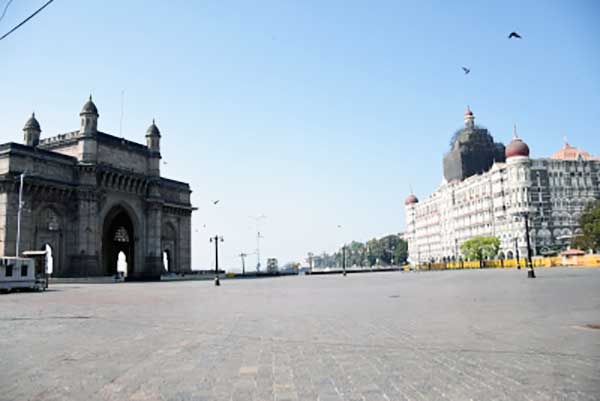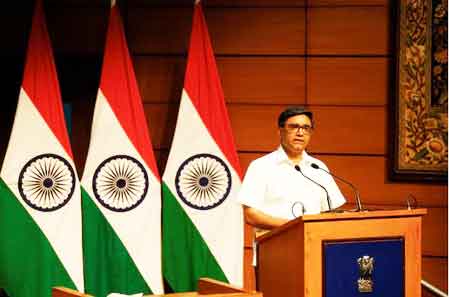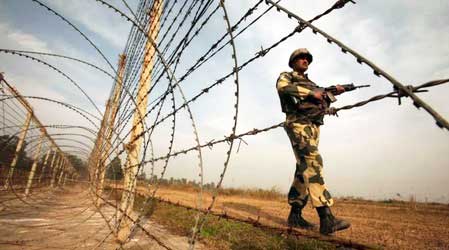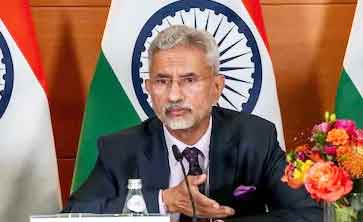Till March 1993, Mumbai (Bombay) was one big 24x365 party destination, a city that never slept and where all seemed obsessed with minting money --from the poor pavement-dwellers to the wily politicians to the pompous tycoons, and even big bulls like Harshad Mehta and his cohorts, who had then shot into limelight.
The term 'terror' was considered hazy, distant, something that happened in remote borders, shrugging off the occasional blast here or there in the country, and the brash city remained aloof from such unpleasantries.
One warm afternoon of March 12, 1993, 'terror' abruptly knocked in -- and knocked out the city's mega-ego a dozen times with 12 coordinated mega-blasts -- starting at around 1.30 p.m.
Barely 100 minutes later, the country's commercial capital was on its knees, the police launched investigations, politicians gave speeches and the final (official) bloodied body count stood at 257, another 1,400 injured and some others 'missing'.
Soon, it came to light that the Mumbai terror blasts were out of 'vendetta' for the barbaric two-phased communal riots of December 1992 - January 1993 that shook the city as a fallout of the demolition of the Babri Mosque in Ayodhya.
The perpetrators were the city's dreaded mafia baddies, along with help from a variety of cops and customs officials, unknown Pakistanis, and even a prominent film star - all of whom orchestrated the country's deadliest and biggest (in terms of casualties) terror strike ever.
The country then watched the longest legal trial unwinding with the Special Public Prosecutors like Ujjwal Nikam and Deepak Salvi, challenged by topnotch lawyers on the defence side, including Majeed Memon and others in the Special Courts, later Bombay High Court and even the Supreme Court for various accused.
As things appeared to normalise, Mumbai was again caught napping on a cool evening of November 26, 2008 -- when it became the theatre of a dastardly terror strike that killed 175 (including nine terrorists) -- which ended after over 60 hours.
Though separated by 15 years -- and even a 'century' on the calendar -- the ultra-hits on Mumbai had glaring differences and similarities -- as comparisons between them became inevitable over the years.
For instance, the two strikes came when the city seemed completely off-guard, one on a weekend-leading Friday afternoon and the other on a mid-week Wednesday evening, both saw the smuggling of explosives quietly and terrorists sneaking in unhindered from the unlikely and unguarded Arabian Sea route.
In 1993 bombs were placed by hired foot-soldiers at 12 strategic locations spanning the length of the city and partly into the suburbs, but in 2008, sophisticated automatic weapons were used by the 10 Pakistani fidayeens to spray bullets on the gullible people in a surgical manner covering a tiny area of south Mumbai.
The first one (1993) saw the perpetrators quietly planting the RDX bombs at 12 selected spots and scooting, with some lowly operatives later pressing the trigger in tandem with others, the second one (2008) witnessed the trigger-happy attackers coming headlong, randomly raining bullets or lobbing grenades at 12 targeted locations, often in direct 'encounters' with the Indian security personnel.
The ratty Mumbai mafia secretively, but allegedly supported by Pakistan, implemented the 100-minute-long 1993 blasts, but in 2008 10 heavily-armed Pakistani gunmen, knowingly or unknowingly helped by the Mumbai mafiosi holed up in that country, executed the 60-hour-long operation.
After 1993, several of the prime movers-and-shakers like Dawood Ibrahim Kaskar and Ibrahim Mushtaq Abdul Razzaq Memon, alias 'Tiger Memon', and other fearsome ones still elude the Indian laws, and post-2008, baddies like Lashkar-e-Taiba's Zakiur Rehman Lakhvi is at large and remains among India's 'Most Wanted'.
Both terror hits case trials -- 1993 and 2008 -- have practically ended and may be revived as and when the other absconding accused can be brought here and tried.
Mumbai after 1993 remained vulnerable and faced another half-dozen strikes like -- two killed in a Ghatkopar BEST bus bomb blast (December 2002), one killed in a bicycle bomb explosion (January 2003), 10 killed in Mulund suburban train blast (March 2003), four blown up a bus bomb explosion in Ghatkopar (July 2003), 50 snuffed out in the twin bomb blasts at Zaveri Bazar and Gateway of India (August 2003), and the monstrous killer bombs planted in seven suburban trains killing 209 commuters (July 2006).
However, things seemed to have improved after 2008 terror strikes with only one major incident reported from Mumbai -- the killing of 26 people in the coordinated triple blasts one each at Opera House, Zaveri Bazar and Dadar (July 2011) in 10 minutes.
Other debates also continue -- on the demands to reveal the N.N. Vohra Committee Report after the 1993 explosions, certain investigations into the suspected role of political or bureaucratic elements, their alleged underworld links, which remain under the wraps... till date.
A silver lining is that after 1993, the government ruthlessly hounded the mafia, hundreds of gangsters were eliminated in 'encounter kills' -- which later became controversial as 'contract murders', the hold of the mafia slipped a lot, broad daylight gang-wars are history, though there are the occasional rumours of bigwigs getting extortion threats from the underworld, but they probably prefer to silently concur and endure.
After 2008, Mumbai has become a lot more vigilant, people alert and aware, the police and other agencies better equipped to deal with a similar onslaught in future, the coastal borders now more patrolled and secure with modern aircraft, boats, ships and ultra-sophisticated communication, etc.
Yet, a full 30 years after March 12, 1993, many who witnessed or survived the bomb attacks, still shudder and shiver, offering silent gratitude for their own 'escape' from certain death.






24 airports shut, airlines issue travel advisories amid tensions between India-Pakistan
The Civil Aviation Ministry has said that 24 airports across the country have been temporarily closed for civil flight operations as of Thursday evening amid escalating tensions between India and Pakistan, which soared further after a Pakistani drone and missile attack on Indian cities in Jammu, Punjab, Gujarat and Rajasthan.
India to present its case today before IMF to review bailout package to Pakistan
India will put forward the country's position at a board meeting of the International Monetary Fund in Washington on Friday, Foreign Secretary Vikram Misri said in response to a query on New Delhi asking for a review of loans to Pakistan.
India-Pakistan conflict is 'none of our business', says US Vice-President Vance
US Vice-President J.D. Vance has said that the conflict between India and Pakistan is "fundamentally none of our business," though he and President Donald Trump are encouraging both the countries to de-escalate.
BSF foils infiltration bid in J&K's Samba, heavy mortar shelling continues by Pakistan
After its drones and low range missiles fired to target defence installations were neutralised by the alert troops in Jammu, Samba, R.S. Pura and other places, terrorists aided by Pakistan troops made an unsuccessful infiltration attempt in Jammu and Kashmir's Samba district on the International Border.
8 pistols, 16 empty magazines found on train arriving in Agartala from Punjab
The Government Railway Police (GRP) and Railway Protection Force (RPF), in a joint operation on Thursday, recovered eight pistols and 16 empty magazines from an express train after it reached Agartala railway station from Punjab, officials said.
ISRO Chairman to grace 5th Convocation of Central Agricultural University on May 11
The Central Agricultural University (CAU) is set to hold its fifth convocation ceremony on May 11, 2025, at the campus hall of the College of Fisheries in Lembuchhara. This was announced today by Professor A.B. Patil, Dean of the Fishery College, during a press conference held on campus.
National Lok Adalat in Tripura on May 10; Over 21,000 cases to be taken up
The second National Lok Adalat of the year is set to be held across Tripura on Saturday, May 10. The initiative will be conducted not only at the Tripura High Court but also in all district and sub-divisional court complexes across the state.